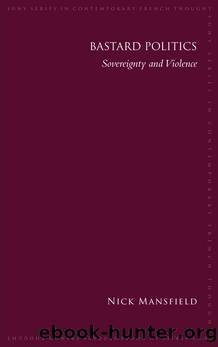Bastard Politics by Mansfield Nick;

Author:Mansfield, Nick;
Language: eng
Format: epub
Publisher: State University of New York Press
Published: 2021-04-15T00:00:00+00:00
We are talking about the killing of children, perpetrated either by God or by a vacuous nonself, so we are not simply making a theological point or using violence as a metaphor. Suspended timelessly in the twilight world between fairy tale and nightmare, the terror of the children Gilles de Rais killed inhabits Western culture as the epitome of the unthinkable still widely thought. This unthinkable cannot be erased from our broader philosophical consciousness either. To Bataille, âGodâ was simply an attempt to literalize or personalize that larger phenomenon of the unreachable, undefinable, unlivable thing that oriented human subjectivity. Sovereignty is not merely the rhetorical abstraction of a religious consciousness. For Bataille, it is clearly the other way round. God is the name we use to protect ourselves from the sovereignty that is forever our horizon. This definition of sovereignty echoes in Derridaâs account of the story of Abraham but also in his discussions of more political concepts, especially justice, democracy, and hospitality.
To Derrida, law is instituted in relation to a justice that is always larger than it. Law attempts to institute justice in the world and gains whatever authority it has by its evocation of justice and its perpetual attempt to enact it. Yet, the law will never be just enough. It will always be subject to reform, improvement, refinement and to being more effective, more far-reaching, and a purer enunciation and instantiation of justice. In this way, justice always requires more of law than it is capable of giving. It can always challenge, harry, or deconstruct the law. It thus always threatens, undermines, and violates it. The law arises only in this perpetual violation of itself in the name of pursuing justice. Law then must act out justice, but if it became justice, it would become only the violence that it does to itself. For law to identify with the absoluteness of justice, it would thus become pure violence, unaccountable, unlicensed, and massacring.
The same risk arises with democracy. To Derrida, democracy as an instituted political system is always oriented toward what he calls democracy-to-come, the horizon of ever-extending equity, freedom, and openness that gives democratic institutions their orientation, justification, and meaning. Democracy-to-come is not an ideal against which we measure our present arrangements, nor is it a goal that we can one day expect to realize. It is the impulse to reform and improve always and forever our democratic values and practices. We are open to the ever-expanding possibilities of democracy-to-come because it is itself openness. Yet, in its will to convert all, to saturate the human world and to remodel all societies, the orientation of democratic actors toward an infinite democracy-to-come threatens to become another unaccountable violence. A loss of the constituting aporia that puts democracy in relation to the democracy-to-come that gives it meaning but that it must not become, and that it must not mistake for something realizable, risks a violence that would persist beyond the world of the knowable and measurable.
How many children did Gilles de Rais kill? A hundred? Two hundred? A thousand? Nobody knows.
Download
This site does not store any files on its server. We only index and link to content provided by other sites. Please contact the content providers to delete copyright contents if any and email us, we'll remove relevant links or contents immediately.
| Elections & Political Process | Ideologies & Doctrines |
| International & World Politics | Political Science |
| Public Affairs & Policy | Specific Topics |
| United States |
The Secret History by Donna Tartt(16675)
The Social Justice Warrior Handbook by Lisa De Pasquale(11495)
Thirteen Reasons Why by Jay Asher(7808)
This Is How You Lose Her by Junot Diaz(5802)
Weapons of Math Destruction by Cathy O'Neil(5055)
Zero to One by Peter Thiel(4840)
The Myth of the Strong Leader by Archie Brown(4796)
Promise Me, Dad by Joe Biden(4460)
Beartown by Fredrik Backman(4442)
How Democracies Die by Steven Levitsky & Daniel Ziblatt(4427)
Stone's Rules by Roger Stone(4426)
The Fire Next Time by James Baldwin(4354)
100 Deadly Skills by Clint Emerson(4091)
A Higher Loyalty: Truth, Lies, and Leadership by James Comey(4044)
Rise and Kill First by Ronen Bergman(4026)
The David Icke Guide to the Global Conspiracy (and how to end it) by David Icke(3899)
The Farm by Tom Rob Smith(3883)
Secrecy World by Jake Bernstein(3793)
The Doomsday Machine by Daniel Ellsberg(3742)
